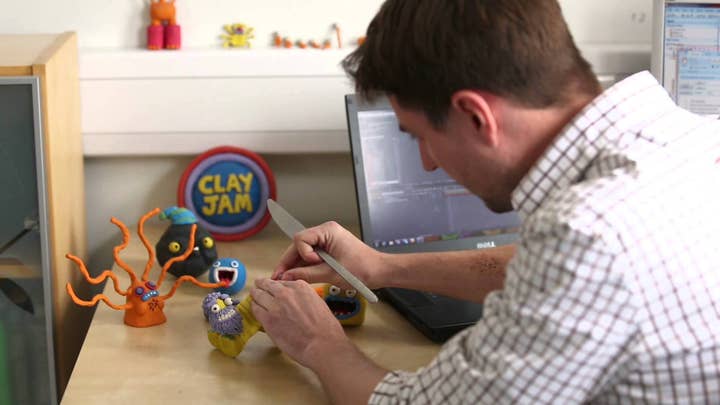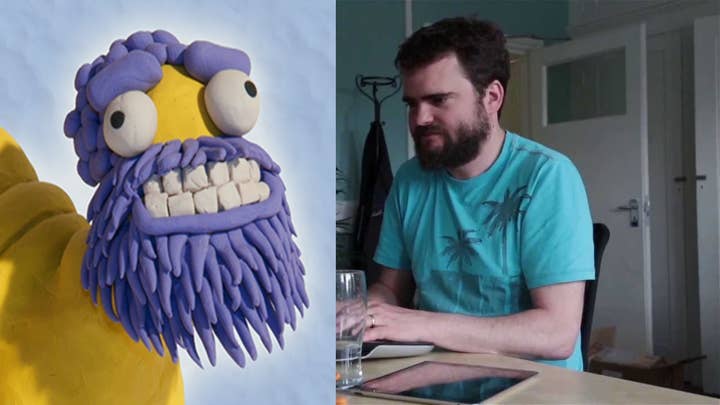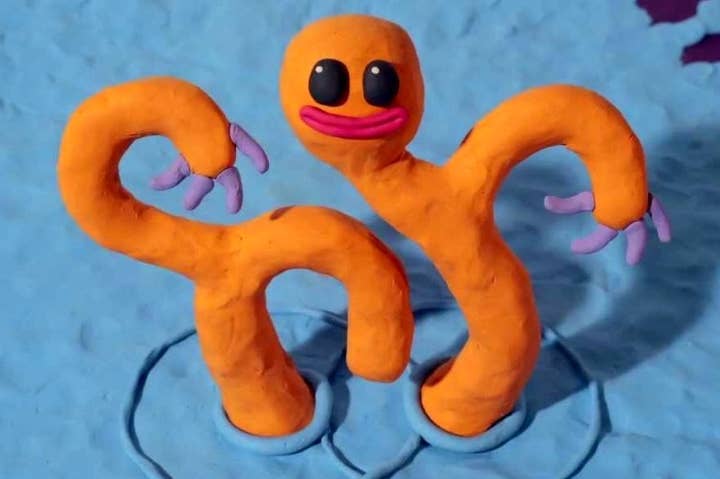"Not aggressive, not manipulative. It's a challenge we've set ourselves."
Fat Pebble: Putting heart into hand made games
Clay Jam should have made Fat Pebble plenty of money. It was published by Zynga, clocking up nearly eight million downloads on iOS and Android. It's fun, accessible and beautifully presented in the studio's hallmark hand made claymation style. It's almost everything a successful free-to-play mobile title should be - but it's never made anybody rich.
"Monetising-wise, it wasn't great," sighs Fat Pebble co-founder Mike Movel, his regret definitely moderated with what sounds a bit like pride. "Obviously we have to improve the monetisation, because Clay Jam didn't make us enough to make another game, so there's no two ways about it."
Last time I interviewed Mike, the ink was still fresh on the Zynga deal. Fat Pebble was a tiny start-up of just three people, working out of a cramped office above a crèche. Clay Jam was largely hand made by animator Chris Roe in his garage with a DSLR, some modelling clay and a bit of ad-hoc lighting. Here was a talented indie team with a great idea who'd landed a publishing deal with one of the world's most successful free-to-play companies, launching on the fastest growing platform in gaming. The only thing between them and success was generosity, and unfortunately Clay Jam had it in spades.
"There was a point where we actually got kind of scared about it, because there's a lot of rubbish games out there that exploit people. You don't want to do that, we don't want to do that"
When Clay Jam came out, Zynga was looking to change its image. Perceived as a company which just saw metrics and MAU, every player a profit margin, Zynga was attracting bad feeling from players and developers alike. In response, Mark Pincus wanted to create a more welcoming corporate identity and attract more indie studios with fresh ideas which fell well outside of Zynga's 'Ville strategy. An admirable goal, but a change which happened at the wrong time for Fat Pebble.
Instead of promoting the strong monetisation which Clay Jam needed, Zynga was very "hands off", leaving Fat Pebble to get on with it. Movel allows that they were "actually really good to work for," but co-founder Iain Gilfeather counters that they could have helped a lot more with the tricky strategy of monetisation, especially when the team had no previous experience.
"We came from a console background, so it was kind of weird to go to free-to-play," explains Mike. "It was a very new model for us - we didn't really understand it. There was a point where we actually got kind of scared about it, because there's a lot of rubbish games out there that exploit people. You don't want to do that, we don't want to do that. But then you see the odd gem coming through, you see that more and more. We have that in our head all the time - that's what we want to do, to create a brilliant, beautiful-looking game that's fun to play, which does well commercially. Not aggressive, not manipulative. It's a challenge we've set ourselves.
"It's a young model, though. People are making better and better games for it all the time. What it has done, and what it's done really well, is that it's bought millions of new players in, millions of players who I think are getting more and more into games. When they first started, they were playing casual games - and that's fine: they're fun and accessible - but now, and I think Clash of Clans is an excellent example of this, they're coming more and more into the mid-core. Those millions of players are all discovering more and more depth. If you do it right, you can make a brilliant game with lots of depth and still monetise well. You can create a game for everyone to play, where everyone can have fun, but there's the opportunity to spend more if you want to."

Clay Jam might not have put Fat Pebble into a comfortable retirement, but it was very far from being a failure. The team retained the IP, and eight million downloads, even if they're not monetising well, has to be considered a success. Undaunted, the team grew and took on new projects.
"We started working on a prototype through the Abertay fund for a game called Creature Box," says Movel, "which eventually got picked up by a big publisher in America. So after the prototyping we started working on that full time. We ramped up our team from five to 24 so it was a massive jump - we got some brilliant people, it was really intense getting so many people so quickly. The publisher had a brilliant team as well, loads of really switched-on, smart people.
"At the start it felt like we were all working towards the same goal, but...I guess it's just that thing where you have two separate entities then your goals often just aren't quite aligned, everyone has their own agenda. In the end we were going in different directions, so we split, amicably. We've kept the IP so we can pick it up again if we want to - if we did, we'd redo a lot of stuff, so it'd be a very different game, but it's a good result."
Sadly, there aren't 24 people in the office any more. Whilst it was a decision which the team still clearly firmly believes was right to make, ending that deal prematurely had ramifications.
"When we split with our US publisher at the end of last year, to be honest...that was really painful," says Movel with sincerity. "We had to lay a lot of people off, it was horrible. The way we work here, we're a really close, tight-knit community, we're friends. So yeah, horrible. Now we're past that a little bit. We've still got a bloody brilliant team here, they're really enthusiastic."
"I guess at some point all of our games will come out on console. We won't do that in house, we'll focus on mobile, but externally we'll have that done"
The company's strategy of IP retention is certainly a wise one, though, and it's beginning to pay dividends. Clay Jam is being reworked as a licensed work-for-hire project for a third party that Movel can't reveal, but even then the original version remains in Fat Pebble's hands. Movel and his team aren't taking it for granted, either - there are major plans afoot.
"We've got some external people doing a Clay Jam port to PS3, PS4, 360, Xbox One, Steam, Wii U, 3DS, Vita," he tells me. "We've got a really flexible deal. I guess at some point all of our games will come out on console. We won't do that in house, we'll focus on mobile, but externally we'll have that done. While we're going to self-publish in the west, we're going to have publishing partners to go to in Asia. We've got a deal with a company in China which is sort of a test for us - they're going to re-release Clay Jam in China, they'll spend two or three months adapting it for that market. It'll be interesting to see what they do."
New projects are underway, too, one of which relates to a big, familiar box on a shelf in the corner of the office - something which grabbed my eye as soon as I walked in. It's a childhood staple which still conjurers up happy memories of rainy afternoons lying on a living room floor: Crossbows and Catapults.
The game itself was brilliant. Each player had a few handfuls of oversized plastic building blocks and a spring-loaded keep to defend a scattering of tiny plastic warriors. In addition, players had an elastic-band powered arsenal of the titular war machines which launched thick plastic counters at the enemy's defences. There were probably rules, but, like 90 per cent of enjoyable childhood activities, it was basically about building stuff then knocking it down. Fat Pebble's new game, codenamed Fling Things, hopes to emulate that simple destructive pleasure: make a castle, then kick the crap out of someone else's.
"We're testing the fun now, and it is fun," says Movel with a big grin. "The core of the game is to build and destroy, but we want to add layers of depth, strategic depth that you can get into if you want to, layers that will make the game last."
Fling Things will also continue the studio's tradition of being 'hand made', although this time there are concessions for the physics, so photogrammetry will be used as well as stop frame animation.

"It's a physics-based game and networks and real-time physics simulations don't necessarily play together very nicely," says Gilfeather, slightly ruefully. "It's an...interesting technical problem. It doesn't actually add any time to the development process, though, as long as you've built up the right balance of artistic talent, and the rest of the team understand the constraints that we need to work within. What does take longer is if you have to make any changes when you're in the middle of production. That's why we tend to have a longer prototyping phase than other companies."
When I first saw Clay Jam, I was struck by how ripe it seemed for spinning out into physical products. Rovio was making huge strides in the direction of merchandising and I fully expected Clay Jam to follow suit, but that's yet to happen. I ask Movel if he still has ambitions in that direction.
"We're concentrating in the short-term on making a great game, but I think that's always in the background. I think in the long term we've got a few goals, but in the medium term we really want to be one of the most successful games companies in the world. I really think we can do that - we've got a brilliant team and we've got a style that really sets us apart - the way we make our games really lends itself to making short films that tie into game IP, or eBooks, other bits of merchandising that all tie in."
"I think a lot of the older publishers are so slow to change that we'd be looking for younger partners who know how to bring things to market in a different way, how to be quick and agile"
Merchandising is no small task, however, and even the always-cheerful Roe might balk at the task of manufacturing a line of toys in his garage. Luckily, it looks like his evenings are his own for now.
"We'd be looking for partners," says Movel. "But...I think a lot of the older publishers are so slow to change that we'd be looking for younger partners who know how to bring things to market in a different way, how to be quick and agile. We're also looking for investment. If we don't get investment, we'll be fine, but it'll help in achieving our goals. We're talking to a few people. We'd be happy to give away a share of the company for the right money and expertise."
"That's one of the advantages of an investor over a publisher," adds Gilfeather, as we wrap up. "Investors always want the company to do well, they're in it for the long term. For publishers, they're less involved, at the end of it they just want a good game."









